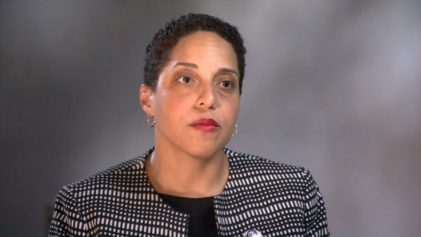
Philadelphia District Attorney Larry Krasner has issued a memo to his staff that directs them to seek lower charges, fewer charges and diversionary measures that will mean fewer people in jail and prison for shorter periods of time. The new policy, which reflects Krasner’s emphasis on eliminating mass incarceration, provides a model for other district attorneys to emulate. (Photo: Flickr)
Larry Krasner — the new Philadelphia district attorney who rode into office on the promise of criminal justice reform and ending mass incarceration — wrote a memo to his assistant district attorneys that could provide a template for how woke, progressive-minded prosecutors can change the system.
Krasner, the criminal defense and civil rights attorney with a 30-year career of suing the police 75 times, made waves and made good on his promises to bring about a culture change when he fired 31 attorneys in his office in January. Now he has provided his staff with a game-changing memo designed to place fewer people behind bars for shorter periods of time. In the document, Philly’s top prosecutor provides an alternative to the tough-on-crime stance of his predecessors and contemporaries in some other jurisdictions.
For example, the memo articulates a policy of declining to charge certain offenses, including the purchase and possession of marijuana — regardless of the weight involved — and offenses involving marijuana paraphernalia. The new policy also directs prosecutors not to charge in prostitution cases where the person arrested has one, two or no convictions for prostitution, and withdraw all pending cases falling under these criteria. Those people with at least three prostitution convictions will be referred to DAWN court, which refers nonviolent repeat offenders with reentry and therapeutic services to reduce recidivism. Consider that Pennsylvania courts tend to have harsh five-year mandatory sentencing for offenses such as prostitution, and between 2010 and 2015, the Philadelphia Police Department made 5,650 arrests for prostitution as opposed to 1,239 for solicitation.
In addition, Krasner has told his staff to charge lower gradations for certain offenses such as retail theft, charging them as summary offenses or “non-traffic citations” on the grounds that it “greatly reduces pre-trial incarceration rates as no bail is required and the shorter time required for hearings expedites Municipal and Common Pleas dockets.”
The other side of seeking lower charges or no charges at all for certain crimes is a heightened focus on diversion and reentry, with a goal towards seeking justice accountability while avoiding convictions in some cases. Some examples of people eligible for diversion include a person charged with marijuana delivery, or an otherwise law-abiding individual charged with a first DUI who has no license, or a responsible gun owner who does not have a carry permit. Further, the new policy emphasizes more reentry programs as a crime-reduction measure, plea deals with lower sentences and more probation, house arrest and alternative sentences.
One feature that stands out in this already dramatic policy for Philadelphia prosecutors concerns sentencing. “AT SENTENCING, STATE THE BENEFITS AND COSTS OF THE SENTENCE YOU ARE RECOMMENDING,” the memo urges in bold type, recommending a conservative figure of $42,000 annual cost to incarcerate a person — $3,500 per month or $115 per day. The rationale that the district attorney’s office provides for this policy change is that the United States has the highest incarceration rate in the world, and while the national incarceration rate has increased 500 percent in the past few decades, the rate for Pennsylvania and Philadelphia has increased 700 percent during the same time frame, giving the city the highest incarceration rate of the ten largest cities in America. “Yet Pennsylvania and Philadelphia are not safer as a result, due to wasting resources in corrections rather than investing in other measures that reduce crime,” the memo says.
Over-incarceration has bankrupted more effective crime prevention investments such as public education, addiction treatment, policing, job training and economic development, according to the document, and harms the defendant’s family and work relationships that aid in rehabilitation. The memo maintains that the goal of sentencing must be to seek justice for society and prevent crimes, and lower incarceration rates for those who should not have longer sentences than are necessary to divert resources to crime prevention.
“These policies are an effort to end mass incarceration and bring balance back to sentencing,” the memo continued. “All policies are presumptive, not mandatory requirements. Where extraordinary circumstances suggest that an exception is appropriate, specific supervisory approval must be obtained.”
News of the policy changes comes as Krasner announced he would end cash bail for low-level offenses, effective immediately, following a resolution from the Philadelphia City Council calling for a reduced reliance on the practice, which disproportionately impacts poor people and contributes to impoverishment. “There is absolutely no reason why someone who will show up for court, is not a flight risk, and is no threat to their neighbors and community, needs to sit in jail for days because they can’t post a small amount of bail,” Krasner said. People arrested for one of 25 nonviolent offenses such as identity theft, retail theft, resisting arrest, prostitution, marijuana possession, food stamp fraud, DUI, and forgery will be eligible.
The local context that prosecutors should keep in mind when carrying out their duties, as the district attorney’s office noted in its memo, is that the actual cost to incarcerate someone for a year is at least $42,000 but arguably close to $60,000 — the range for a starting salary for a teacher, social worker, police officer or assistant DA. This, as the average family income in Philadelphia is $41,000. With Larry Krasner, Philadelphia appears to be paving the way for a new type of prosecutor who measures success not by the number of people in prison, but by the number of people who are not behind bars. Whether other cities will follow suit remains to be seen.

